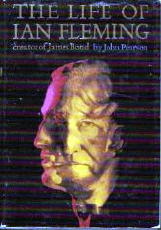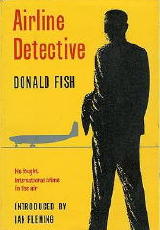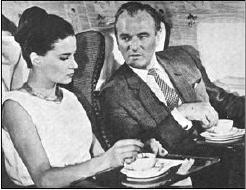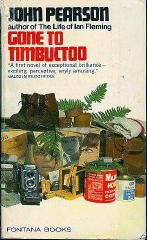Fri 28 Dec 2007
John Pearson was one of the authors recently covered here on the Mystery*File blog in a recent installment of the Addenda to the Revised Crime Fiction IV, by Allen J. Hubin.
Unfortunately in this case, we happened to have gotten some basic facts wrong. Soon after the post appeared we learned of some changes that had to be made. It was Hank Reineke who left the following comment, and just from reading it I believe you can deduce what we had wrong. (Both the post and the Addenda itself have been changed to incorporate what Hank had to say.)
First, a repeat of his previous comment:
 “John Pearson is alive and well, I’m very happy to say. I interviewed Mr. Pearson in January 2006 for a feature article that studied his noteworthy and welcome contributions to the Ian Fleming/James Bond cycle. The article/interview appears in issue no. 49 of 007 Magazine Online. I queried Mr. Pearson about the Dragon’s Play entry in the Crime Fiction tome, but Mr. Pearson told me he wrote no such novel, the credit is in error. He has written a score of other books — including a few thrillers — and his 1973 novel James Bond: The Authorised Biography of 007 has recently been reissued in the UK.”
“John Pearson is alive and well, I’m very happy to say. I interviewed Mr. Pearson in January 2006 for a feature article that studied his noteworthy and welcome contributions to the Ian Fleming/James Bond cycle. The article/interview appears in issue no. 49 of 007 Magazine Online. I queried Mr. Pearson about the Dragon’s Play entry in the Crime Fiction tome, but Mr. Pearson told me he wrote no such novel, the credit is in error. He has written a score of other books — including a few thrillers — and his 1973 novel James Bond: The Authorised Biography of 007 has recently been reissued in the UK.”
I replied right away, of course, sending his comment on to Al Hubin for his reaction and both of us asking a few questions. Here’s Hank’s reply:
 Allen and Steve,
Allen and Steve,
I’m glad to have been of some assistance. Pearson was, arguably, the best of the Ian Fleming biographers (The Life of Ian Fleming, Jonathan Cape, 1966). He served as Fleming’s assistant when both men worked at the Sunday Times of London. Fleming arranged for Pearson to ghost-write his first book Airline Detective: The Fight Against International Air Crime as Donald E. W. Fish (also published in as a paperback in the UK as Zero One).
The book was so popular it spawned the thirty-nine episode BBC-TV adventure series Zero One (1962-1965) featuring Nigel Patrick as Alan Garnett, Chief Investigator for the International Air Security Board. Airline Detective was, technically, non-fiction as it was the story of the real “Donald Fish,” but I believe there was a great deal of artistic license employed.

Incidentally, Ian Fleming provided the introduction to the original Collins 1962 edition.
Pearson’s first proper novel Gone To Timbuctoo (Collins, London) was also first published in 1962. Fleming sent Pearson to Africa for the Times and he returned with this travelogue suspense-thriller set in Africa that involved diamond smuggling and slave trading among other things. Pearson was awarded the Author’s Club Award in 1962 for Gone To Timbuctoo in the “Best First Novel” category.

Most of Pearson’s books are non-fiction works and he seems he have switched between biographies of literary figures, royal subjects and London-based criminals. In the latter category was The Profession of Violence: The Rise and Fall of the Kray Twins (1972) which was nominated for the prestigious Edgar Allan Poe Award in 1974 for “Best Fact Crime” from the Mystery Writers of America.
Years later he followed that book up with The Cult of Violence: The Untold Story of the Krays (2001) and, most recently, The Gamblers: John Aspinall, James Goldsmith and the Murder of Lord Lucan (2005). I believe The Gamblers is being made into a feature film or, at least, I think I’ve read that somewhere. Oh, I almost forgot: Pearson’s One of the Family: The Englishman and the Mafia (2003). More info and background material on that title, can be found here.
If I can be of more help, please don’t hesitate to write.
Hank
April 5th, 2009 at 7:32 am
Interesting piece of info about John. He has recently very kindly scribed my copy of his bio about Ian Fleming writing :
“To IAN,
With all best wishes and a firm dry, Bond-like hand clasp,
From John Pearson
DEC 2008”
I also spoke briefly to him also on the phone. Great chap and a real gentleman !!!!
June 30th, 2009 at 12:33 pm
Dear Hank, I have been trying to find contact details for John Pearson, is there any hope that you could pass them on to me, as I would very much like to ask him about some of the facts in his book “One Of The Family,”
Many thanks
Fiona Hyslop
December 6th, 2009 at 9:16 pm
Before discovering the Pearson bio of Fleming, I had tripped on to two books written by Trebitsch Lincoln, a former MP and later in Naval Intelligence, assigned to Rm. 39. Would Mr. Pearson divulge any credence to the possibility that Fleming based any of Bond’s experiences on the activity of this notorious character from British lore.
April 1st, 2010 at 8:18 am
I just found this on here.
John Pearson or ‘P’ as my whole family call him, is my grandfather. I love that comment he autographed in your book! So typical of his sense of humour.
Lydia
August 26th, 2010 at 12:48 pm
I am a great fan of John Pearson’s “The Life of Ian Fleming,” which I hold in the highest regards as the definitive work on James Bond’s creator. (2.) As the agent for the Estate of Geoffrey Jenkins, the great South African thriller writer, who was also a great friend of Ian Fleming, I would like to hear from Mr. Pearson as regards a ‘synopsis’ of PER FINE OUNCE, the “007” continuation novel that went un-published but was commissioned by the Ian Fleming heirs in 1966. It is rumoured that Mr. Pearson saw the ‘synopsis’ and may even have seen the original manuscript, which has been lost, except for 18 pages. As we are eager to find the specific “synopsis” of the original story and the manuscript as a whole, we should like to hear from Mr. Pearson for his verication to the validity of the rumour. (Our “Screen Treatment” registered with the “Writer’s Guild” in the United States is “based upon and suggested by” the Original Jenkins story dealing with “diamond and gold smugglers in the gangster pipeline” that makes up the world of James Bond—with Bond’s name changed to Commander Geoffrey Peace, the hero of Jenkins’s two bestsellers, “A Twist of Sand” and “Hunter Killer.” Best wishes to a fine gentleman, and a great, great writer. Ronald Payne, Agent for the Estate of Geoffrey Jenkins (Geoffrey Jenkins Publications, U.S.A. )
August 26th, 2010 at 12:59 pm
The verification of Geoffrey Jenkins’s ‘synopsis’ and ‘manuscript’ of PER FINE OUNCE amongst the Fleming papers is most important to us at “Geoffrey Jenkins Publications.” Anyone who might have some knowledge of the complete manuscript’s whereabouts, should contact us, right away—as there would be some compensation for the effort. (Listen to the Ron Payne interview about Geoffrey Jenkins and James Bond at http://www.audioentertainment.org/dwp for (Past Programs) January 20, 2010, “Dave White Presents.” (2.) George Lazenby, the former James Bond 007 of “On Her Majesty’s Secret Service” can be heard at the same site for Past Programs—January 6, 2010, in which Mr. Lazenby discusses how he captured the role of “double-0-seven”, after the sudden departure of Sean Connery in 1967, after the release of “You Only Live Twice.”
August 26th, 2010 at 8:17 pm
Ronald
As I’m not in direct contact with Mr Pearson, I’ve forwarded both of your comments on to Hank Reineke, whom I imagine will get in touch.
— Steve
October 15th, 2010 at 6:59 am
Hello,
I am trying to find any contact details for John Pearson as well as we want to broadcast something on “James Bond´s 90th birthday” for the international German TV station “DW-TV”. If you could help me, it would be great!
Thanks Sharon Berkal
September 14th, 2011 at 4:51 am
When I looked at contacting John I just followed the publishing/publishers trail and eh presto got in touch with him – not difficult folks !!
I am listening to the Bond books via talking book at present and THE SPY WHO LOVED ME is one of the most unusual stories in Bond format I have ever read/heard !! It is read by Rula Lenska who fits into the Bond rhythm perfectly.
I am reading JAMES BOND – THE MAN AND HIS WORLD by Henry Chancellor at the moment – brilliant !! John is mentioned in that also.
As a longtime friend of Roald Dahl’s niece and mother, I have always wondered if RD and Fleming were friends and I found a comment in Chancellor’s book and on page 257 of John’s book recently which may just confirm they were friends and colleagues.
How did Ronald Payne get on with his research/queries [no relation I may add] ?
January 11th, 2012 at 11:11 am
Dear Hank,
I would be very much delighted if you could possibly pass onto me the contact details of John Pearson. Or, if you could point me in the right direction with the publishing/publishers et cetra.
I would very much like to ask him a few questions on his biography of Ian Fleming.
I hope you would be of great assistance.
Many Thanks,
Lee Fisher
January 11th, 2012 at 6:23 pm
Lee
I’ve passed your inquiry along to Hank.
Steve
February 25th, 2013 at 7:16 am
I do would greatly appreciate John Pearson’s publisher’s or agent’s contact details. Fleming worked with my grandfather at NID in the war and I’d love to be able t speak to Mr. Pearson about his research.
Many thanks,
Wendy Wrangham